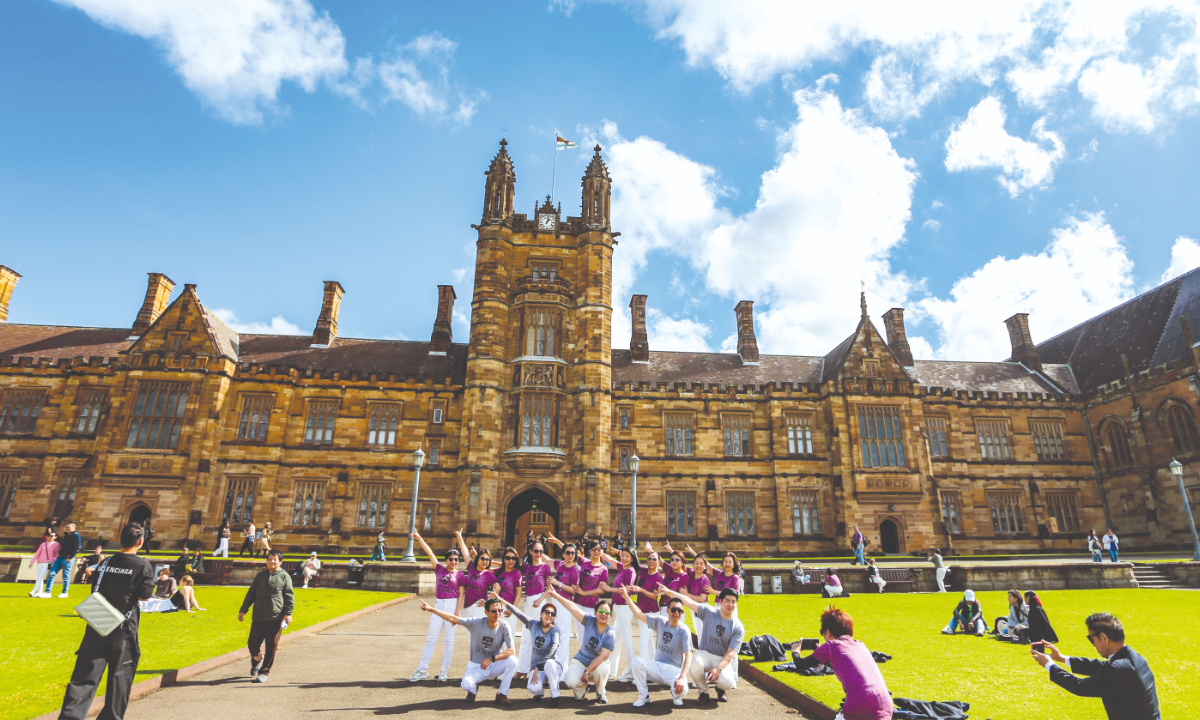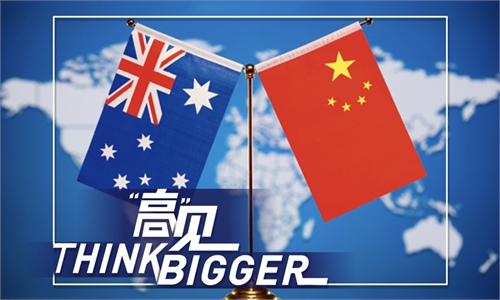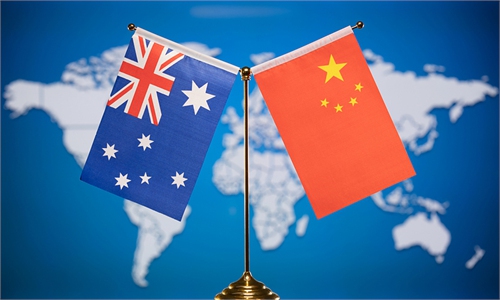Chinese students, tourists expected to make strong rebound in Australia after ties eased

Visitors taking photos at the University of Sydney, Australia, on August 31, 2023. Photo: VCG
Like many other Chinese applicants planning to study in Australia, Zheng Yiwen (pseudonym) is waiting anxiously for offers from some universities, while at the same time, racing to submit her applications to many other universities during the application season for the next February intake which typically starts in August and ends in January.
"We have a WeChat group with hundreds of applicants and sometimes we talk about why we decided to go to an Australian school," Zheng said, listing the main motivating factors including quality education with relatively low threshold, inclusive cultural environment and, of course, the friendly and preferential policies amid the warming ties between China and Australia recently.
"I'm so excited that I recently got an offer from University of Sydney. But I still want to wait for one from University of Melbourne as that is my preferred choice as the major I applied for is stronger there," Zheng said.
About a dozen Chinese students, contacted by the Global Times, said they are now more confident about studying in Australia after the country's Prime Minister Anthony Albanese made a landmark visit to China and the two countries agreed that they would further support and enhance personnel exchanges, mutual understanding and amity between the two peoples.
After around seven years, the first Australian prime minister visited China earlier this month, which has undoubtedly opened a new chapter for the bilateral ties and boosted people-to-people exchanges that have once suffered a "cold winter" as the former Australian government followed Washington's hostile policy toward China.
Warming up
According to the latest data provided to the Global Times, Qunar.com - a major Chinese travel platform - recorded a slump in ticket prices of flights to Australia. It is estimated that by next month, a direct flight from Beijing to Sydney will be priced at 1940 yuan ($451.35) at the lowest while a direct flight from Shanghai to Sydney will cost 2050 yuan at the lowest.
Air ticket prices from China to Australia decreased by more than 50 percent compared with the first half of the year, Qunar.com revealed.
Coinciding with Australia entering into its January and February tourist season, the number of Australian visa inquiries in November increased by 57 percent compared with the same period in 2019. The number of travel orders to Australia in the past two weeks increased by 80 percent compared with the same period in 2019, of which many customers enquired about 2024 winter vacation or Spring Festival travel, according to Qunar.com.
As well as the number of outbound visitors to Australia, the number of overseas students from China is also anticipated to surge.
The policy changes in Australia in recent years are really beneficial to international students, the Global Times learnt from a Beijing-based overseas study agency. It is expected that a large number of Chinese students will be enrolled in Australian schools in 2024, a senior education expert from the agency told the Global Times.
"It is a good time for overseas study in the South Pacific country," the expert said.
She listed several factors. "In the past two years, the exchange rate of the Australian dollar to the Chinese yuan has been hovering at about 4.7, which is around the lowest level in nearly 10 years, so if you study in Australia for two years, tuition fees and living expenses are easily saved by tens of thousands of yuan."
Also, several Australian top universities have prominently climbed up the QS World University Rankings, compared to universities in the UK and the US. Those universities in Australia are known for "lenient to enter, but strict to graduate," according to the expert.
In addition, the Australian government has extended the Temporary Graduate Work visa (subclass 485) for more than 400 bachelor's and master's programmes and all PhD programmes from July. This means many undergraduates are able to stay and work in Australia for four years, rather than two years. Many master's students are able to stay for five years, rather than three, according to Australian media reports.
"We have significantly more student clients applying for Australian schools this year," the expert noted.
Favorable factors
The Australian Department of Education released the latest data, showing that 725,528 international students studying in the country from January to August, 31 percent higher than the same period last year. Among them, 154,467 are from China, over one fifth of the total number of offshore students in the country. China is still the largest source of students studying in Australia.
During the COVID pandemic, when Scott Morrison was in office, Canberra closely followed Washington's anti-China policy and under that political atmosphere, China hatred went on spike in the society which led to many cases of racism against Asian students in Australia, Chen Hong, president of the Chinese Association of Australian Studies and director of the Australian Studies Centre at East China Normal University, told the Global Times on Wednesday. Now the government has strengthened its measures in response to the racist incidents, aiming to provide a friendly and inclusive environment for international students and other visitors.
Also, he noted that the former Morrison administration politicized cultural communication and linked some education exchanges to the so-called national security, making many Chinese students uncomfortable, which also resulted in a drop in the number of offshore enrollments.
Chen also shared with the Global Times his school's partnership with Australian universities. "Recently, the cooperation projects with Australian sides including exchange student program have fully resumed," Chen said, noting that many students are enthusiastic to conduct an academic visit across the ocean under the warming bilateral ties in politics, trade as well as people-to-people exchanges.
Some of his students who are PhD and Master Degree candidates have now started their academic research and learning in Australia, according to Chen. As a crucial asset for both countries, the international students can bond the two sides more closely, laying a foundation for the understanding of bilateral relations, the analyst said.



